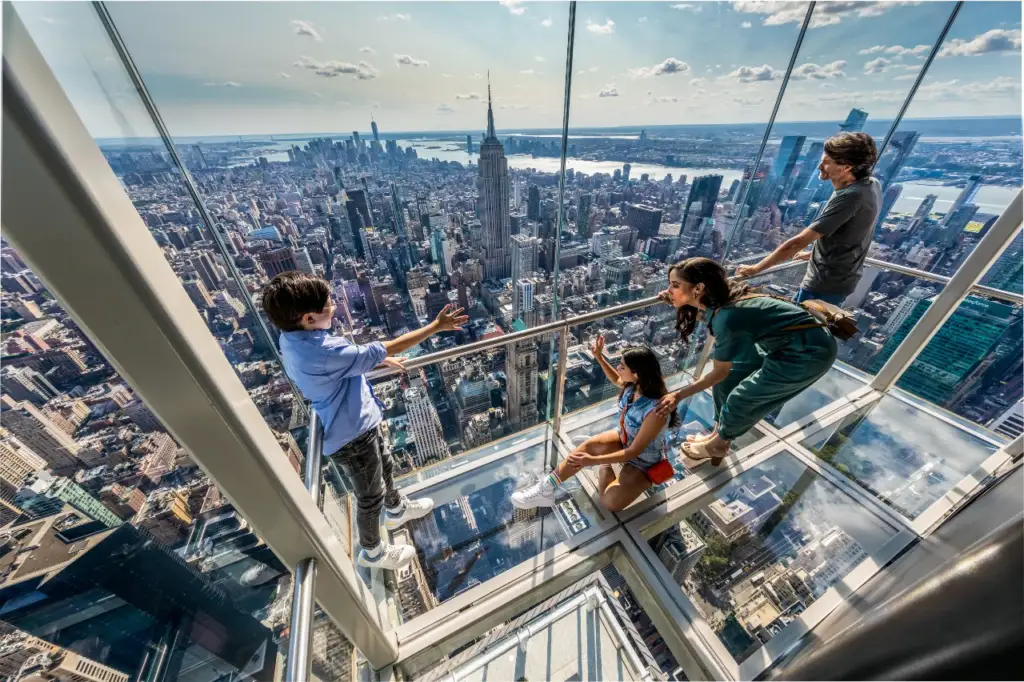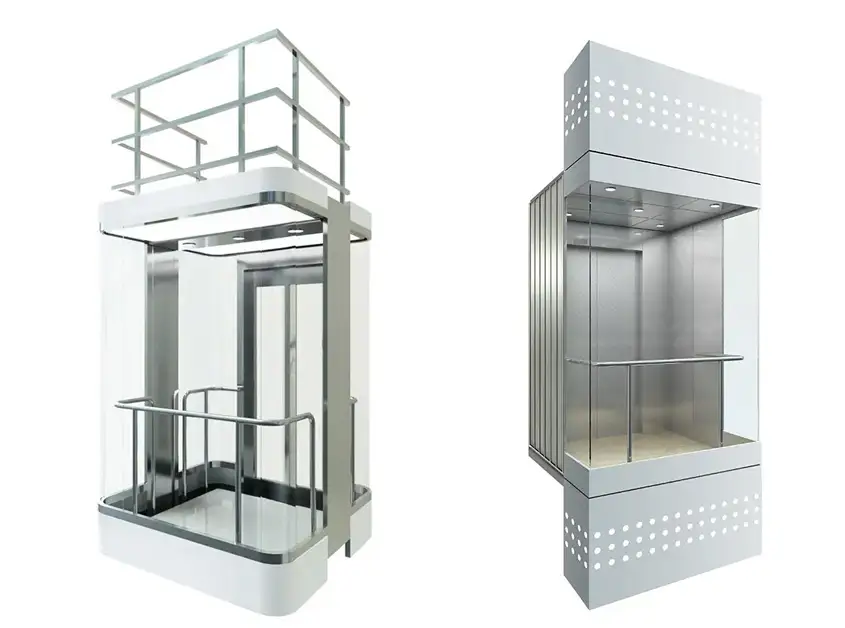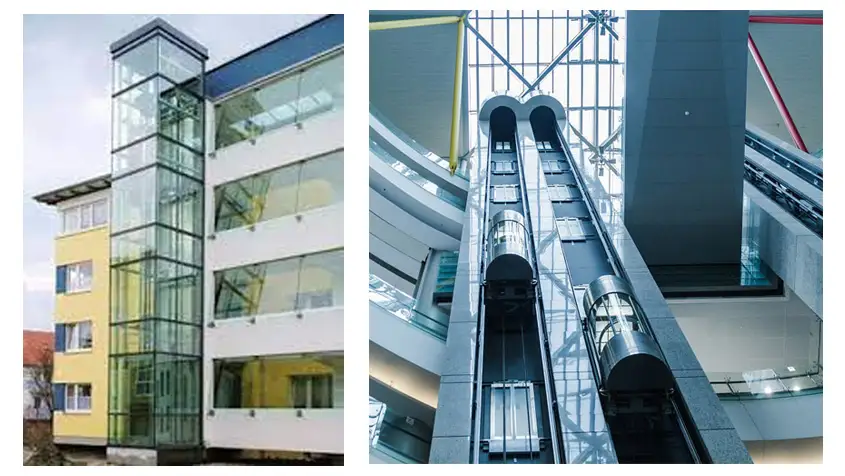What is A Panoramic Elevator?
A panoramic elevator is a unique kind of raise that offers passengers not just a mode of vertical transportation but additionally an immersive visual enjoyment. Characterized by means of its transparent walls and, in some instances, ceiling, it allows riders to understand expansive views of their surroundings as they ascend or descend through a building. This can offer an experience of spaciousness and decrease emotions of claustrophobia frequently associated with traditional elevators. Beyond capability, panoramic elevators are architectural statements, improving the aesthetic attraction of the shape they may be housed in. They provide dynamic perspectives of the surroundings, whether it’s a motel lobby, a shopping center, an office complicated, or the cityscape itself.

Types of Panoramic Elevators
Below, we delve into a deeper explanation of the kinds of panoramic elevators, which may be categorized based on their layout, vicinity, and the sort of drive device they use.
Design-Based Types
- Full-Glass Elevators: These are elevators wherein all the walls and occasionally even the ceiling and ground are made of transparent, hardened glass. They provide the most complete panoramic view, ideal for scenic places like hotels, department stores, or vacation websites.
- Partially-Glass Elevators: In these elevators, the handiest one or two walls are fabricated from glass, with the relaxation being opaque. These are generally found in workplace homes or residential complexes in which privacy can be a situation, or where the view is directional.

Shape-Based Types
- Semi-Circular Panoramic Elevators: These elevators are characterized by their curved glass walls which form a semi-circle. They provide passengers with an expansive, unobstructed view of the building’s interior or outside. The curved glass partitions aren’t the most effective visually appealing, however, additionally, they provide a feeling of spaciousness. These styles of elevators are regularly discovered in shopping malls and modern office buildings.
- Cut-Angle Panoramic Elevators: Cut-angle panoramic elevators, also called angular or polygonal panoramic elevators, have glass partitions that can be arranged in an angular layout. This layout creates a unique visible dynamic and permits a couple of viewing angles. It can add a hint of modernity and sophistication to a construction’s design. These elevators are often custom-made to fit into unique architectural designs or spaces where a traditional rectangular or circular elevator might not fit.
- Square Panoramic Elevators: Square panoramic elevators are the most traditional and common kind. They feature direct, flat glass partitions on one or more sides of the elevator car. This layout gives a clear, unobstructed view, improving the passenger’s feeling of openness. Square panoramic elevators are flexible and may be included in diverse sorts of homes, from residential to commercial, without disrupting architectural harmony.

Location-Based Types
- External Panoramic Elevators: These are mounted on the outside of homes, offering unobstructed views of the encompassing surroundings. They are often utilized in high-rise homes, accommodations, or observation towers.
- Internal Panoramic Elevators: These are situated inside buildings, commonly in a large atrium or foyer vicinity. They offer views of the building’s interior structure and decor.

Drive System-Based Types
- Hydraulic Panoramic Elevators: These elevators use a hydraulic machine to raise and lower the elevator. They are normally utilized in low to medium-height homes because of their exceptionally slower pace and decreased installation and maintenance charges.
- Traction Panoramic Elevators: These use a device of cables and pulleys, making them suitable for high-rise buildings because of their higher speeds and smoother rides. However, they’re extra luxurious to install and maintain compared to hydraulic elevators.
- Machine Room-Less (MRL) Panoramic Elevators: These elevators have their equipment housed in the elevator shaft, saving space, and presenting an extra aesthetically fascinating appearance.
Each kind of panoramic elevator comes with its very own set of advantages and capacity drawbacks, and the selection of which to install relies upon a selection of factors along with the height of the building, the preferred view, the available area, and the financial constraints.

Structure of Panoramic Elevator: Delving Deeper into the Panoramic Experience
Panoramic elevators have revolutionized the way we understand vertical transportation. They are a testimony to the correct harmony of engineering and layout, presenting a visual pleasure while pleasurable their sensible reason. Let’s delve deeper into the structure of these charming sightseeing elevators.
- Car Structure: The car, or cabin, is the heart of any elevator, and in a sightseeing elevator, it is designed to provide the most viewing satisfaction. The use of transparent substances, usually tempered or laminated glass, lets passengers enjoy a wide-ranging view for the duration of their journey. The partitions, and in sure designs, the ground and ceiling, are made transparent. The framework of the car is typically constructed from high-strength metallic or lightweight, long-lasting alloys, ensuring both protection and aesthetic attraction. The indoors of the car regularly boasts a graceful, present-day design, with minimalistic fixtures to preserve the focal point of the view outdoors.
- Drive System: The drive system is the powerhouse that moves the elevator vehicle. Sightseeing elevators primarily use two sorts of power structures – traction and hydraulic. Traction structures work with the assistance of metallic cables, pulleys, and a counterweight, whilst hydraulic systems operate by way of pushing a liquid through a cylinder. To maintain the visible appeal, the machinery associated with the drive gadget is hidden discreetly, ensuring it would not impede the panoramic view.
- Safety Systems: The safety of passengers is paramount in sightseeing elevators. These elevators come ready with safety brakes that could stop the auto in case of over-speeding, a velocity governor to control the velocity of the car, and buffers at the lowest of the elevator shaft to absorb the effect if the auto descends too quickly. Alarm systems are in place for passengers to alert protection in case of emergencies. Additionally, the glass used in these elevators is specially treated to withstand heavy loads and save you from shattering.
- Control System: The control system of sightseeing elevators is an advanced setup that manages the operation of the elevator, dictating its speed, ensuring it stops accurately at floors, and controlling the hole and remaining doorways. It includes the control panel in the elevator car for passengers to select their ground, as well as the controls utilized by service technicians for preservation and troubleshooting. In many contemporary elevators, these structures are digitized and might also be incorporated with building control systems for greater performance.

Features of Panoramic Elevator
Panoramic elevators, at the same time as visually lovely, are also characterized by way of their overall performance capabilities, including velocity, and capacity. Each of these factors performs a critical function inside the standard capability and person revel in these elevators.
- Speed: The speed of panoramic elevators can vary based on the height of the building and the specific requirements of the project. Residential and low-rise commercial buildings typically have panoramic elevators with speeds ranging from 0.5 to 1.5 meters per second. In contrast, panoramic elevators in high-rise buildings or observation towers may have speeds up to 2.5 to 8 meters per second to efficiently transport passengers to higher levels.
- Capacity: The capacity of panoramic elevators refers to the maximum load they can carry, regularly measured in phrases of the number of passengers. This can range extensively based on the size of the elevator and the needs of the building. Small panoramic elevators may have a capability of 4-6 persons, whilst larger ones in industrial settings can accommodate 10-20 persons or maybe extra. It’s important to observe that the potential must constantly observe safety guidelines to make sure the elevator’s safe operation.
- Energy Efficiency: Many modern panoramic elevators are designed with energy performance in thoughts. This can involve using regenerative drives which can recover and reuse energy, LED lighting fixtures structures, and standby modes that reduce strength intake while the elevator isn’t always in use.
- Customization: A unique function of panoramic elevators is the high diploma of customization they offer. This can include choices in the type and coloration of the glass, the interior finishes and lighting fixtures, the kind of doorways (swing, sliding, or telescopic), or even the shape and length of the elevator. To further enrich the person’s enjoyment, many sightseeing elevators include additional functions like tune structures and digital information screens. Some even have climate control systems to ensure passenger consolation.

Understanding the Investment: Panoramic Elevator Costs
Incorporating a panoramic elevator into your property, whether residential or commercial, is a substantial investment with a multitude of variables affecting the overall cost. The price of panoramic elevators primarily depends on the design, type, size, and customizations required, along with factors such as installation complexity and maintenance needs. For example, a standard two-story panoramic elevator with basic features can start around $20,000 to $30,000. However, if you’re opting for a high-rise, fully customized panoramic elevator with advanced features, the cost can easily exceed $100,000. It’s important to remember that beyond the initial cost, ongoing expenses such as maintenance, inspections, and potential repairs should be factored into the total investment. Given the range in costs and the custom nature of these installations, consulting with a reputable elevator company will provide the most accurate estimate for your specific project. The investment in a panoramic elevator, while significant, enhances not only the functionality of the building but also its aesthetic appeal and value, making it a worthwhile consideration.
How to Choose A Panoramic Elevator Manufacturer For Your Building
Choosing the right panoramic elevator manufacturer for your building is a decision that requires careful consideration. This is especially true when sourcing from China, a country known for its competitive manufacturing industry. Among the numerous manufacturers, Dazen Elevators has emerged as a reliable option, thanks to its comprehensive approach to quality, price, and service.
- Parts Availability and Logistics: a robust supply chain and efficient inventory management, minimizing the chances of parts loss during production or shipping. We have established efficient logistics processes, helping clients save on associated costs.
- Local Installation Support: Dazen provides support for local installation, either through their dedicated teams or by coordinating with local companies. This ensures the elevator installation process is smooth and efficient.
- Competitive Pricing: Dazen offers competitive pricing without compromising on quality. It’s advisable to obtain a quote and understand what it includes, as we often provides comprehensive packages covering shipping, installation, and after-sales service.
- Safety Certifications: Safety is a cornerstone of Dazen’s manufacturing process. Our company holds valid safety certificates, including the China Compulsory Certificate (CCC), ISO9001-2000, ISO14000, CE certification, EN81-20 and 50etc. assuring you of their commitment to safety standards.
- After-Sales Service: Dazen stands out for its robust after-sales service, including warranty, maintenance, repairs, and customer support. The availability of spare parts and their commitment to service have earned us a strong reputation in the industry.
- Customization Capabilities: For clients with specific requirements, Dazen offers a high degree of customization. This could range from custom sizes, shapes, finishes, or technical features – Dazen works closely with clients to fulfill these needs.
- Financial Stability: Dazen’s strong financial stability assures clients of their ability to deliver a quality product on time, honor warranties, and be available for future service and maintenance needs.
Choosing a panoramic elevator manufacturer requires balancing several factors. With companies like Dazen Elevators, you can be confident of receiving a quality product with excellent service, ensuring a successful project and a safe, aesthetically pleasing addition to your building.
